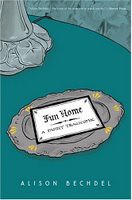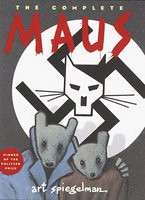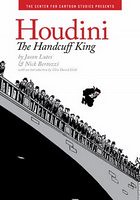


Comics
January 2009
Buyer Beware
I eagerly snapped up Fun Home: A Family Tragicomic by Alison Bechdel the moment that I saw it on the shelves in the Teen Room. I couldn’t remember where I saw a review of her 2006 graphic novel—I had, somewhere—but having pored through bunches of her Dykes to Watch Out For strips years back, I was excited to see what she could do with long-form cartooning. In Dykes to Watch Out For, Bechdel offers a warm, engaging and heartfelt study of a community of lesbians, and I was expecting something similar in her recollection of discovering that she was gay and that her father was a closeted homosexual. Instead, I was disappointed by what I saw as a cool, almost clinical approach to the topic, and I was confused by the quotes on the cover that described the book as “gripping,” “generous,” “heart-stopping” and “absorbing.”
About a month earlier, I had picked up last year’s American Born Chinese by Gene Luen Yang from the same shelves. Its cover boldly proclaims that the book is a winner of the Michael L. Prinz Award and a National Book Award nominee. Aimed at tweens, Yang’s story about ethnic shame is intended to appeal to me even less than stories about lesbian life, but I was thrilled with its passages about the Monkey King, interested in Jin Wang’s travails, bothered by the overly-cartoonish Chin-Kee and horrified by the graphic novel’s contrived and inauthentic ending. American Born Chinese made me wish desperately for a version that was only about the excellent Monkey King or at least one that didn’t leave such a dubious taste in my mouth.
As an award winner, American Born Chinese brought to mind the grand travesty of award-winning graphic novels known as Maus, which won the Pulitzer Prize Special Letters Award in 1992. Maus is a two volume narrative about the Holocaust and its lasting effect on a survivor based on a metaphor of Jews as mice, Nazis as cats, and Poles as pigs. Regardless of how much talent you believe Art Spiegelman has and how important and compelling the Holocaust is, I cannot be convinced that anyone can overcome such a puerile allegory to create great literature.
Now, I’m not saying that you shouldn’t read Fun Home, American Born Chinese or Maus. None of them are bad or even not so good. They’re all worthwhile books, and they certainly deserve your attention. What I am saying is that they don’t live up to their hype. If you pick up one of these books because of the reviews or the awards, don’t be fooled into thinking that you’ve gotten hold of the best in graphic literature. One thing I notice about all three is that they deal with challenging subjects: sexual betrayal, racial self-hatred and genocide. Could this be why they’re touted and not because they’re really, really good comics? I’ve heard the same thing said year after year about the films that win the Academy Award for Best Picture—that they’re important but not necessarily the best.

If you’re looking for a graphic novel that represents the highest standards of cartooning, I recommend this year’s Houdini: The Handcuff King by Jason Lutes and Nick Bertozzi. It’s a slim, slice-of-life study of a 1908 Houdini stunt in Cambridge, Massachusetts that’s suspenseful, literate, accurate and very engaging. It’s packaged with a scene-setting introduction, end notes, a bibliography and even a brief cartooning how-to. And if you read it and one of the other graphic novels that I’ve mentioned here, you’ll see some of what distinguishes great comics from simply good ones. Great comics are out there, and while it may take some effort to find them, they’re definitely worth the search.
Wil Gregersen
Community Services Librarian




